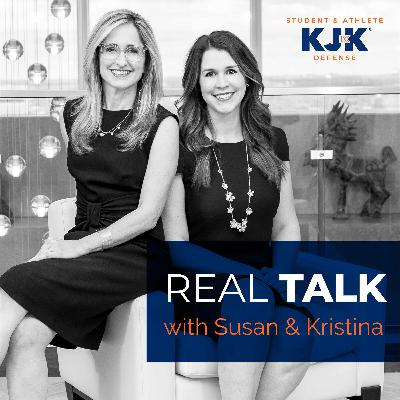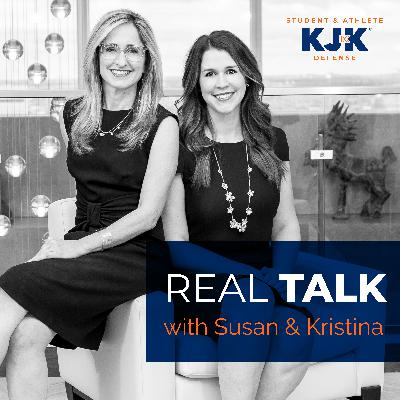Exploring the Topic of Gender Identity for both Parents and Children
Description
In this episode, KJK Student Defense attorneys Susan Stone and Kristina Supler talk with Dr. Michelle Fourcier, a Professor of Pediatrics, Assistant Dean of Medicine at The Warren Alpert Medical School of Brown University. Dr. Forcier specializes in gender, sexual and reproductive health. In this episode, they talk about what all the terms of LGBTQ+ mean, how pediatricians work with both parents and children about gender identity, and resources for parents to learn more about this complicated issue.
Links:
Show Notes:
(04:12 ) Understanding the Gender Terminology within LGBTQ+
(06:59 ) How Does Type of Care Different from Heteronormative
(09:27 ) Assigned Gender versus Gender Identity: What is the Difference?
(12:16 ) Is the Child Just Playing With Identities? Or Do We Need to Act?
(15:02 ) When Does a Physician Decide if Hormones are Required?
(16:44 ) Do We Want Puberty in Children to Happen Later?
(18:11 ) How Pediatricians Work With Children to Keep Them Safe
(19:15 ) What are the Side Effects of Hormones?
(20:52 ) Blockers: What Do They Do?
(22:43 ) Conversations with Parents Who Are Not on Board with Hormones or Blockers
(24:45 ) When Do Children Go Through Surgery?
(25:32 ) When Surgery for Minors may be Necessary
(27:46 ) What are LARCs? How Do They Prevent STIs?
(30:36 ) Dual Method for Birth Control and STI prevention
(31:46 ) Consider This Thought If Your 14 Year Old Child is Sexually Active
(34:19 ) Resources for Parents to Learn More
Transcript:
Susan Stone: So everybody out there listening to this podcast know that my, this is Susan and my daughter got married this weekend, and I'm a little tired.
But
Kristina Supler: though you think everyone knows that. Everyone doesn't actually know that.
Susan Stone: I know, but I felt the need. This is Real Talk guys out there on listening land. I am exhausted. But I had to come into work today cuz they knew that we had, the books, the recording of this podcast. And we're gonna talk about pediatric health for the L G P.
Lg, I told you I'm tired. BTQ Plus community and I, Kristina, I just wanna have a conversation about the health needs and not a political conversation.
Kristina Supler: Yeah. I'm really looking forward to today's episode because I think there's so muchto talk about and learn to have more real conversations about the issues versus some of the politicized language that has pushed people into corners and people have in many ways shut down and are not open to learning new information.
Susan Stone: and I think we're just forgetting that we're still talking about kids. So why don't you kick off the guest so we can just launch in and talk about whatever the health needs are of the kids and guys, let's leave the politics out. Okay? For once.
Kristina Supler: Today we are really happy to be joined by Dr. Michelle Fourier, who is an associate professor of pediatrics and an assistant dean at the medical school at Brown University.
And with extensive training and experience in adolescent health and sexual healthcare, she's dedicated her career to addressing the unique needs of the LGBTQ plus youth.
Susan Stone: That is the guest we needed for today's podcast, a Doctor.
Perfect.
Dr. Michelle Forcier: So let's jump in.
Susan Stone: Let's just jump in. Dr. Fourier, can you explain exactly what you do for that population?
Dr. Michelle Forcier: I have been a pediatrician for about 25 plus years. And I've been providing gender, sex and reproductive justice care, basically across the lifespanfor this period of time. And it's been a pretty exciting, community, pretty wonderful and satisfying community to work for and to work with.
And the way I look at providing care for the L G B T Q community is that it really is primary care. Basically gender and sexuality are part of human identity. And they're there before we leave the womb. There's a neat study about in utero masturbation, which is kind of cool. So we get started early and we are gendered and sexual persons, until we die.
So if we look at gender and sexuality as being a ubiquitous part of the human experience, and we look at biology as absolutely diversity is a part of biology. It's one of the basic tenets of biology. Then we understand that both sex and gender are gonna be diverse experiences for a range of different people and folks.
And my role has been to provide care for some of our most marginalized community members, which is the L B G T Q I A plus. Sometimes it's easier just to say rainbow population. I like that.
Kristina Supler: Before we dive in further, just to get some terminology nailed down for our listeners who maybe aren't as familiar. you've spoken about gender and sex and we're referencing the plus, but can you just define those terms for our listeners, particularly the plus as well?
Dr. Michelle Forcier: Sure. For many gender has been considered in this very binary, traditional way of male, female. Or heterosexual and homosexual. Sexuality is about who we love and who we're attracted to and who we have different sexual behaviors with. Gender is who we are. It's a part of our identity in terms of being masculine, feminine, non-binary and all the other ways that we could express, a gendered self.
And the world for many years has been pretty limited in terms of only discussing these binary identities. I think with time, with improved social discourse, with the advent of the internet and increasing knowledge spread in, in diverse ways and diverse communities, we understand that there are many, many ways to be sexual and many ways to be gendered.
So the L stands for lesbian, which are persons, we might say women who are attracted to or have sex with women. Gay usually is referenced to either, males or females who are attracted to the same gender partner, bisexual, historically has been the term for people who identify as being attracted to both males and females. But now we have even more inclusive terms, which are things like pansexual, which means gender doesn't factor into who I'm attracted to. Transgender or gender diverse are persons whose gender identity doesn't exactly match the gender they were assigned by their parts, chromosomes or hormones and birth.
I is another. Initial for intersex or persons who have differences, in sexual development in the parts and organs they were born with. And A can mean asexual or persons who really don't have a sexual affinity or an interest in, sexual activity.
allied, And the plus means there are probably a million different ways, and we know there are a million different ways people may identify in terms of how they see themselves as a gendered person and their gender expression and gender role and gender self in the world, as well as their sexual, um, attraction, their sexual behaviors and their sexual identity in the world.
Susan Stone: That's a lot. That's a lot. But here's messy. Something that comes into my mind, because you are a pediatrician. How do those differences make a difference in terms of just treatment for well visits? What is, what type of care is specific and unique to that population as opposed to what I would call a heteronormative child.
Dr. Michelle Fo







